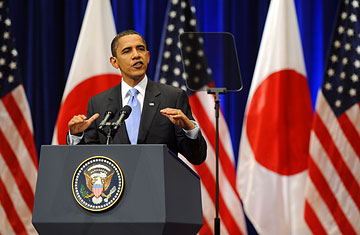
The Nov. 15 meeting in Singapore is only scheduled to last 90 minutes. But in that hour and a half, U.S. President Barack Obama will do much to erase years of perceived American slights felt by 10 Asian nations. For the first time ever, an American President will meet in one room with every leader of the Association of Southeast Asian Nations (ASEAN), a regional grouping that began in 1967 largely as a U.S.-supported bulwark against communism.
ASEAN has grown up since the days of the so-called red threat. Not only are two of its members — Vietnam and Laos — socialist countries, but the regional bloc has transformed itself from an impoverished backwater to a key member of the global economy. Indeed, ASEAN's 600 million citizens have weathered the current global financial crisis far better than the citizenry of many other regions. Indonesia, for instance, is predicting upwards of 4% growth this year.
Indonesia is ASEAN's largest economy. It is also where Obama spent part of his childhood, snacking on his favorite bakso meatballs and learning the local language. (In Singapore, the U.S. President is slated to hold a bilateral meeting with his Indonesian counterpart Susilo Bambang Yudhoyono.) But the U.S. President's scheduled joint appearance with ASEAN leaders is about more than childhood sentimentality. For decades, the U.S. held a comfortable position as ASEAN's third-largest trading partner. No more. China displaced America last year. Even with persuasion from the popular U.S. President, it will be hard to convince Southeast Asians that their futures are more tied to a giant across the Pacific than one closer to home.
Part of the problem, too, is the distance with which the U.S. held ASEAN in recent years. While China, India, Australia and other regional economies have been assiduously wooing Southeast Asia by signing free-trade agreements with the bloc, the U.S., particularly under the presidency of George W. Bush, kept ASEAN at arm's length. One reason was Burma's accession to ASEAN in 1997, which put the U.S. in a tough spot. Washington had been tightening sanctions on the Burmese junta because of its dismal human-rights record. By participating in ASEAN confabs, Bush's State Department worried that it would send an overly conciliatory message to the pariah regime.
ASEAN leaders — who represent Indonesia, Brunei, Malaysia, Thailand, Singapore, Laos, Burma, Vietnam, Cambodia and the Philippines — cried foul. After all, the U.S. didn't boycott the United Nations just because countries like North Korea or Sudan were members. And, in truth, Burma wasn't the only factor. With more pressing foreign-policy priorities in the Middle East, Washington was naturally distracted from courting other parts of the globe. Nonetheless Southeast Asian ministers couldn't help but spot a deliberate snub when then U.S. Secretary of State Condoleezza Rice skipped two ASEAN summits that historically had been attended by a U.S. envoy.
Obama's Administration moved quickly to change the mood. Secretary of State Hillary Clinton took part in the ASEAN regional forum earlier this year, pointedly announcing that “the U.S. is back in Southeast Asia.” Since then Washington has designated an Ambassador to ASEAN, and its Southeast Asia love-fest will culminate with the Nov. 15 summit between Obama and the 10 regional leaders.
Luckily for the U.S., China's pre-eminence in Southeast Asia isn't yet a foregone conclusion. Countries like Vietnam, which was colonized by its northern neighbor for a millennium, are wary of China's growing footprint. And in nations like Indonesia, Burma and Cambodia, it wasn't so long ago that the economic dominance of local Chinese communities catalyzed bloody pogroms and discriminatory laws against the ethnic Chinese. Despite the occasional bursts of anti-Chinese violence, businesses in Thailand and Indonesia are still disproportionately controlled by overseas Chinese today. As a consequence, even as Beijing pleads that it's only interested in trade — not political influence — Southeast Asians are wary of their new big brother.
That's a position the U.S. used to occupy. Ever since its foray in Indochina four decades ago — not to mention its earlier occupation of the Philippines, where it maintained military bases for decades — the U.S. has garnered suspicion for its muscular interventions in the region. Having China take up the role of regional heavy might feel like a relief. But increasing irrelevance isn't an enviable position, either. In his 90 minutes, Obama will have a lot of explaining to do — no matter how pleased ASEAN's leaders will be to meet him.
